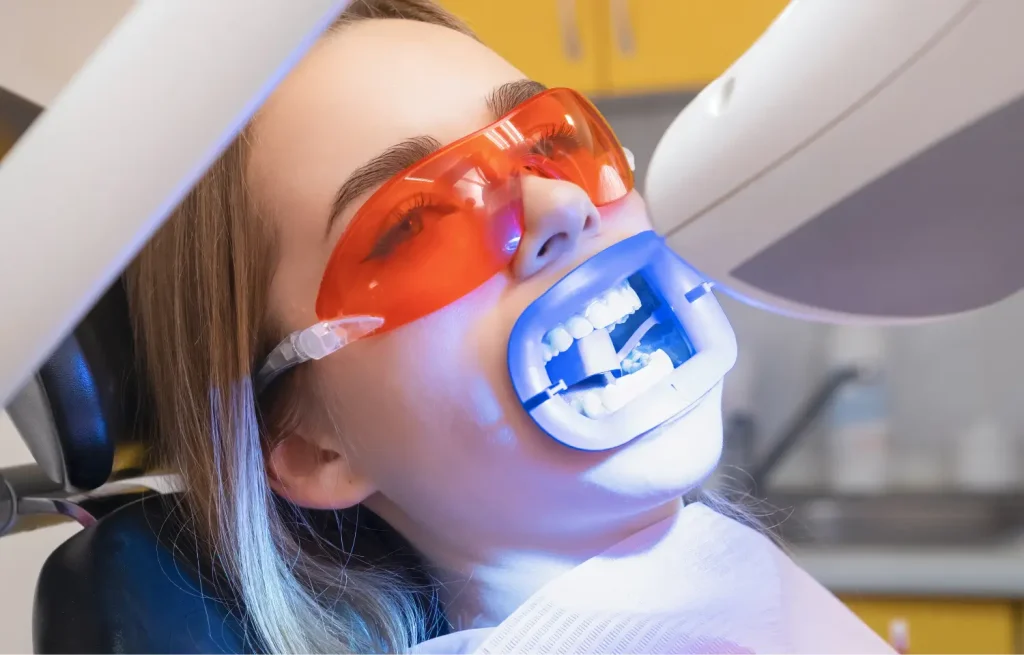Over-the-counter versus professional teeth whitening
1 Aug 2024
Have you ever noticed that the bad guys in films always have yellow teeth? While this is clearly fiction, stained or yellow teeth can indeed impact your confidence. At best, they can ruin an otherwise beautiful smile, and at worst, they can indicate deeper underlying issues.
In any case, teeth whitening is one of the things we’re asked about the most. People want to know what is better with advanced technology now available to whiten teeth and provide a brighter smile. Are there risks with over-the-counter whitening? How long does a professional whitening last?
We answer these questions and more to help you be fully informed if you consider giving your smile a well-deserved touch-up.
Why Do Teeth Get Stained?
As is so often the case, tooth discoloration has multiple causes and a variety of factors. While genetics play a part, many lifestyle choices also stain teeth.
Staining food and drink: Red wine, coffee, and tea are more likely to stain teeth and cause tooth discoloration. These are the most common examples, but any food or drink that has a lot of color can have the same impact—things like Coca-Cola or Pepsi, for example.
Acidic Food and Drink: Carbonated drinks, alcohol, and fruit juices can stain teeth and make them more prone to discoloration.
Medications: Certain medications, such as antibiotics, antihistamines, or chemotherapy, can impact teeth and cause staining or marks.
It could be easy to think that simply avoiding these things will give you a brighter smile, but without actively caring for your teeth, we will all eventually begin to see staining.
Wear and tear with age are as important contributors as diet. A lack of care, for example, less brushing or flossing, will also lead to more tooth discoloration.

Affordable Ways To Whiten Your Teeth At Home
For many people, the first place they look to whiten their teeth is the drugstore. There, we often find a range of tooth-whitening products that promise to brighten our smiles.
As a dental clinic with over 25 years of experience, we can confidently say that these can sometimes be effective and sometimes less so. It can be hard to know what is good and what isn’t, so below, we explore the most common over-the-counter ways to whiten teeth alongside their strength and weaknesses:
Whitening Strips: These strips are applied to the front of the teeth. They bleach your enamel using Hydrogen Peroxide (the same chemical used to bleach hair).
How are whitening strips good?
They are effective at whitening teeth and relatively easy to use. They’re also available in many places, such as drug stores.
How are whitening strips bad?
The strips will only whiten the parts they touch, which can lead to an uneven finish where people can see where you’ve whitened and where you haven’t. They can cause sensitivity in certain people, which can make them uncomfortable. They will not work on implants or veneers.
Whitening Toothpaste: Very similar to normal toothpaste, except with some hydrogen peroxide in them as well as silica. They provide a gentle bleaching action while also smoothing the surface of teeth and removing surface stains.
How are whitening toothpastes good?
They are very easy to include as part of your regular dental care routine and are very cheap compared to other options. They help clean your teeth from food and beverage detritus and whiten them. Also, the effect is gradual, which helps make your teeth seem whiter more slowly and naturally.
How are whitening toothpastes bad?
They are not ideal for people who want an immediate whitening effect and a whiter smile. Some of them have limited effectiveness. The effect may only be surface level, removing surface stains but not providing the whitening effect. They can also be abrasive, which can damage your enamel.
Activated Charcoal: A very trendy option is to use charcoal to help remove surface stains and whiten teeth. It’s important to note there is almost no evidence for the effectiveness of this tooth-whitening product.
How are activated charcoal products good?
They use a natural ingredient rather than more chemical options. They are usually more cost-effective than more professional teeth whitening treatments.
How are activated charcoal products bad?
They are not proven to be effective and may damage teeth through their abrasive nature. They can often leave residue in the mouth or in the bathroom, which can be annoying.
One of the most common questions asked by people looking to whiten their teeth is how safe over-the-counter teeth whitening products are.
Normally they are fine to use, but they can vary in active ingredients and concentration. To help you choose the right option and protect your teeth and gums, here’s a handy checklist:
- Look for the seal of approval from the American Dentist Association (ADA).
- Make sure you follow the instructions.
- Be careful to apply evenly and thoroughly to avoid uneven teeth whitening.
- Always talk to your dentist before using a teeth whitening product.

The Benefits of Professional Teeth Whitening Treatment
As we’ve seen, specific foods and beverages can give you tooth discoloration and stained teeth. We’ve also looked at some options for teeth whitening products that help with a brighter smile that you can purchase over the counter. These have variable effectiveness and duration.
However, there are professional teeth whitening treatments that are tried, tested, and last a long time. They provide whiter teeth for a longer period.
Below are our most recommended options for professional tooth whitening:
Laser Tooth Whitening: this process uses a peroxide gel to coat your teeth which is then activated with a precision laser. It provides an immediate and comprehensive whitening effect, even with deep surface stain removal or tooth discoloration. It is typically the most expensive and takes a long time per session.
Zoom! Teeth Whitening: This uses a process similar to laser whitening, but the gel is activated with UV instead of laser. The whitening effect is often noticeable after a single session and takes typically less than an hour. The effect isn’t as long-lasting as laser treatments and can also be expensive (although less so than laser).
Bleaching: This method uses a custom bleach tray fitted to your teeth. It is perfect for complete coverage and allows you to better control the color gradient. You can also apply bleaching at home, which makes it more convenient. However, of all the options, bleaching is the slowest and requires repeated usage to see whiter teeth.
Comparing Over The Counter Whitening Products With Professional Whitening Treatments
When trying to decide which route to take when whitening your teeth, there are several key elements to consider:
Criteria | Over The Counter Teeth Whitening Products | Professional Teeth Whitening Treatments |
| Cost | $10 – $50 | $200 – $1000 |
| Effectiveness | Gradual results, good to remove surface stains | Very effective and immediate whitening effect |
| Safety | Risk of uneven whitening, sensitivity and gum irritation | Safe with professional guidance |
| Duration | Months, with frequent reapplications | Up to a year with proper teeth cleaning |
We encounter many questions from patients who want a brighter smile. Are whitening strips safe? Can teeth whitening damage gums? Will teeth whitening work on crowns? One of the main benefits of working with a professional like Greenspoint Dental is that we can answer these questions more immediately, with the benefit of 25 years of experience.
Is Professional Teeth Whitening with Greenpoint Dental Worth It?
Greenspoint offers a wide range of professional whitening treatments to help you get the smile you deserve (at prices you can afford!). With over 25 years of experience, we can help you choose the best route based on your desired outcome and budget.
We know going to the dentist can be stressful, which is why we focus on patient-centric, comfort-focused care. We accept many different dental insurance plans, such as CareCredit, Lending Club, and the HELPcard.
Please call (281) 823-9987 today or contact us for a consultation.
Related Blog Articles